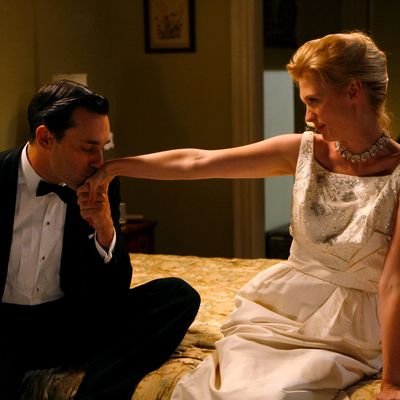
“Who is Donald Draper?” asks Adam Whitman, Don’s long-lost half brother, in the pivotal scene of “5G.” It’s a question that many characters ask about, and of, Mad Men’s hero, and one that Don would ask himself if he were inclined toward self-interrogation. But even if he knew, he wouldn’t tell, because he has many secrets and believes he’d lose everything if they got out. The most affecting scenes in “5G” are about pretending to be what you’re not, and the discipline that this pretense demands.
Ken had let everyone think he was just another account man, so when his story “Tapping a Maple on a Cold Vermont Morning” appears in the Atlantic Monthly, it makes more of an impact on his colleagues than it would have if he’d bragged about it in advance. Ken’s success spooks his coworkers. Until now, they’d done a pretty good job of keeping their own literary ambitions secret. Pete is so jealous that he confesses to his pals, “I want to vomit,” then says with awe and resentment, “It’s a national magazine.” “Yeah,” Harry Crane replies, “and it hurts, too.” In “New Amsterdam,” Don says Sterling Cooper is home to “more failed artists and intellectuals than the Third Reich,” and Roger says in a “5G” accounts meeting that “at the bottom drawer of every desk in this place is the first ten pages of a novel.” “Five,” says Don.
Pete, fresh off familial-financial humiliation in “New Amsterdam,” pressures Trudy into visiting her ex-boyfriend, Charlie Fiddich (Andy Hoff), who works in publishing, to see if he can get one of Pete’s stories—a bit of early-
postmodern fiction, it seems, about a hunter and a talking bear—published somewhere, anywhere. It ends up in Boys’ Life, which seems just about right for a baby-faced man-boy driven mainly by petulance. “Boys’ Life,” says Pete. “Next to exploding cigars.”
Don is at the center of this puny vortex of paranoia and shame, but where others’ stories are grimly amusing, his is tragic. “5G” starts with the agency winning an award that’s perceived as Don’s but that Don insists was really won by Roger and the money side. The award is called the Newkie: it consists of a horseshoe nailed to a plaque. “No one wants to look like they care about awards,” Don tells Betty. “But you do,” she says, and she’s right. Creatively and emotionally, Don is in an impossible spot. It’s good for him and his agency if he lands big accounts and gets attention, but the more acclaimed he becomes, the more closely the industry will scrutinize his life story. The phrase “famous imposter” is an oxymoron if the imposter knows what’s good for him.
We learn the real reason Don’s downplaying his win when Adam Whitman (Jay Paulson) shows up after seeing his long-lost half brother’s picture in Ad Age. Adam’s smile brings back a history Don tried to erase. Adam idolized his half brother and hasn’t seen him since he abandoned the family when Adam was eight. Adam eventually moved to New York and became a janitor at the Empire State Building. He’s a freckled redhead with the apple- pie face of a Norman Rockwell soda jerk.
In Mad Men’s most nerve-racking scene yet, Don visits Adam’s hotel room with a satchel, contents unknown. Because “5G” premiered mere months after the end of The Sopranos, on which Matthew Weiner served as a writer-
producer, some viewers figured that Don was secretly a mobster and that his satchel contained a gun he was going to use to rub his brother out. The $5,000 bribe feels nearly as violent because it’s a shot to Adam’s heart: an emotional rubout.
Don is already on the edge because he’s juggling too many secrets. Adam pushes him over. He’s been contemplating an affair with Rachel Menken and having one with Midge. (When Don resists Midge’s girlfriend-like affection by saying, “This is working right now,” she counters: “Acting like somebody else?”) He’s also deeply self-deceived over his plush sham of a home life. His stop at the railroad crossing in “Marriage of Figaro” was the gesture of a man who’d rather die than face himself.
Of course it’s Don who perfects the notion of an “executive account” for Liberty Capital Savings—a secret, second account for men with second, secret lives. The intent, Don says, is to help “organize your life”; what he really means is “compartmentalize,” although that word wouldn’t come into common usage for another few decades. “A number of our customers were already doing this and we had no way to charge them,” says the point man for Liberty Capital.
There’s nothing in Betty’s dialogue to suggest that she knows precisely what’s up, but on some level she must. Declarations of adoration and dependence pour out of her. They sound desperate, not affirming. Betty tells Don she thinks about him every second while he’s away, that her day builds toward the moment when she hears him walk through the door. She reiterates the frustration she expressed in “Ladies Room” about not knowing much about him and never getting to see him as others do. She says she feels unwelcome in his office, that visiting it is like “walking into another country where I don’t speak the language.” They’re conjoined by marriage but they still feel alone.
Excerpted with permission from Mad Men Carousel by Matt Zoller Seitz.


